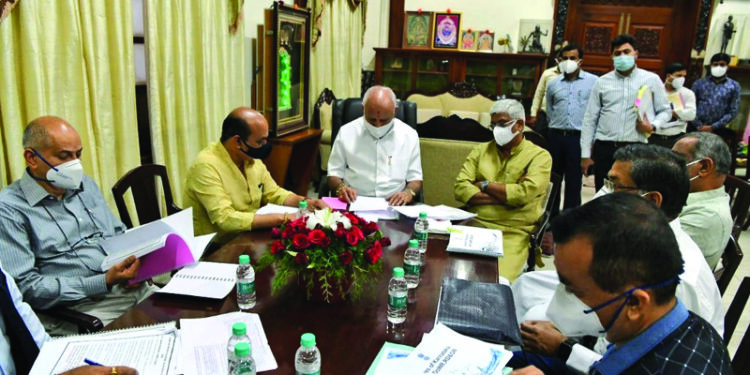NE NEWS SERVICE
BENGALURU, JULY 13
Karnataka Chief Minister B S Yediyurappa on Tuesday once again asserted that the state has got every right to implement the Mekedatu project across river Cauvery and will start the work, despite objections from neighbouring Tamil Nadu.
He held discussions with Union Jalshakti Minister Gajendra Singh Shekhawat and sought clearances from the Centre for implementing Mekedatu and other irrigation projects in the state.
Met Karnataka Chief Minister Shri @BSYBJP at the Vidhana Soudha in Bengaluru today.
Had a fruitful discussion about the state's water issues. Karnataka Home Minister Basavaraj Bommai, Irrigation Minister Madhuswamy were present at the meeting. pic.twitter.com/1vKU6KzBAT
— Gajendra Singh Shekhawat (मोदी का परिवार) (@gssjodhpur) July 13, 2021
“I don’t want to discuss Tamil Nadu or any other state. We have got every right and we are going to start the work,” Yediyurappa said in response to a question on Tamil Nadu’s objection to the Mekedatu project.
Speaking to reporters after the meeting with the union minister, he said detailed discussions took place regarding the irrigation projects in the state, including Mekedatu.
“Definitely in the coming days we are going to complete all the projects and he (union minister) is going to help from the Centre in all respects.. he has assured us to resolve all issues regarding providing clearances from the Centre for the implementation of the projects,” he added.
Discussions were regarding the gazette notification of the Krishna tribunal award, Environment Ministry clearance for Mekedatu project, Upper Krishna Project, Kalasa-Banduri Nala Project, implementation of Yettinahole project, among others.
State’s Home Minister Basavaraj Bommai said the CM has appraised the Union Minister on the Mekedatu issue and urged for the clearances, which are pending before the Government of India.
“Detailed Project Report (DPR) has been submitted to Central Water Commission (CWC) and it has been referred to the Cauvery Monitoring Committee, the union minister is aware of the whole issue and has promised to look into and give justice to Karnataka,” he added.
Also Read:
Karnataka’s assertion comes a day after the all party meeting called by Tamil Nadu Chief Minister M K Stalin condemned attempts by Karnataka to build the dam at Mekedatu and urged the union government to not accord sanction for the proposal.
Earlier in the day, pointing at the meeting between CM and the union Minister, Karnataka Congress President D K Shivakumar in a tweet said, “..we hope that date of initiation of Mekedatu Project will be finalised. This project represents hope for Karnataka, and we expect CM will leave no stone unturned to fulfil it!”
Yediyurappa had earlier written to Stalin urging him not to oppose the Mekedatu project “in the right spirit” and offered to hold a bilateral meeting to address any issues. In response, Stalin had urged Yediyurappa not to pursue the Mekedatu project, as he rejected Karnataka’s stand that implementation of the project would not affect the interests of Tamil Nadu farmers.
Karnataka has maintained that the project within its territory will benefit both states as the surplus water stored can be managed between the two during the distress year, and its implementation will in no way affect the interests of Tamil Nadu’s farming communities, as there will be no impact on its share of water.
While the neighbouring state is of the view that the project would “impound and divert” the uncontrolled water flow due to Tamil Nadu from Kabini sub-basin, the catchment area below Krishnarajasagara, and also from Simsha, Arkavathy and Suvarnavathi sub-basins besides other small streams.
Also, according to Tamil Nadu, as per the Supreme Court verdict no construction across Cauvery should be taken up without consulting the lower riparian states. Mekedatu is a multipurpose (drinking and power) project, which involves building a balancing reservoir, near Kanakapura in Ramanagara district. The project once completed is aimed at ensuring drinking water to Bengaluru and neighbouring areas (4.75 TMC) and also can generate 400 MW power, and the estimated cost of the project is Rs 9,000 crore.










